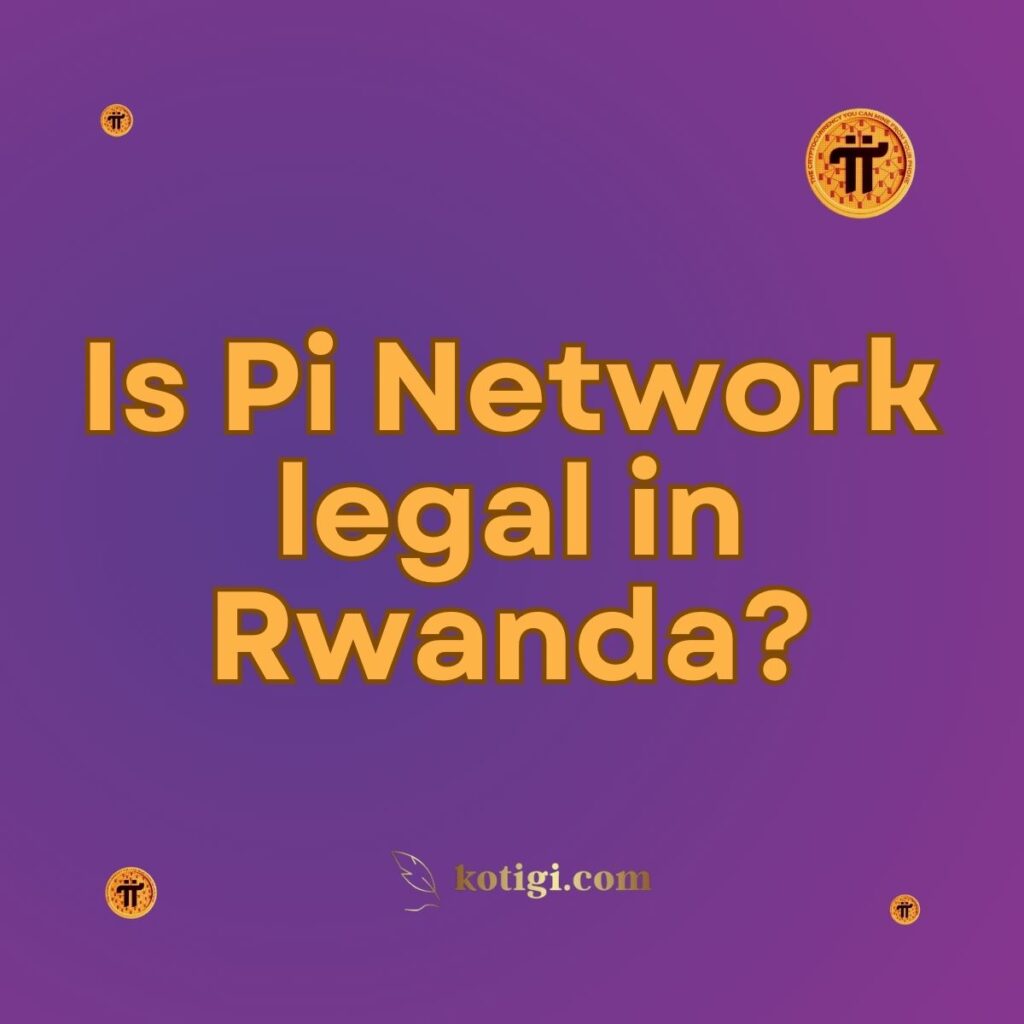
Is Pi Network legal in Rwanda?
Yes, Pi Network is legal in Rwanda. While the country has a developing regulatory framework for cryptocurrencies, Pi Network users in Rwanda can participate without legal issues as long as they comply with existing national regulations on digital assets and taxation.
Introduction
As cryptocurrencies become more widespread globally, Rwandans are increasingly curious about the legal standing of platforms like Pi Network. Pi Network, a decentralized cryptocurrency with a unique mobile mining model, has attracted attention from users across Africa, including Rwanda. Given the evolving regulatory landscape surrounding cryptocurrencies in the country, many users want to know whether participating in Pi Network is legally permissible.
This article will explore the legality of Pi Network in Rwanda, focusing on the broader regulatory framework for cryptocurrencies, taxation requirements, and the potential risks and opportunities for Rwandan users. Understanding these factors is crucial for ensuring that participation in Pi Network remains compliant with Rwandan law.
Overview of Cryptocurrency Regulations in Rwanda
Current Legal Status of Cryptocurrencies
Cryptocurrencies are still relatively new in Rwanda, and the legal framework for these digital assets is in its early stages of development. Rwanda has not explicitly banned the use of cryptocurrencies like Pi Network, nor has it fully regulated them. Instead, the country has taken a cautious approach, monitoring the growth of the cryptocurrency industry while considering future regulatory options.
Pi Network operates legally within this environment as long as users abide by national laws regarding financial transactions, taxation, and anti-money laundering (AML) practices. Rwanda has yet to issue any specific bans or restrictions against Pi Network or similar cryptocurrency platforms.
Government Stance on Digital Currencies
The Rwandan government has expressed interest in exploring digital financial technologies, including cryptocurrencies. The National Bank of Rwanda (BNR) has issued warnings about the risks associated with cryptocurrency trading but has not prohibited their use. While Pi Network does not currently allow the trading of its tokens, the government’s cautious approach means that Pi Network remains legal for users to mine and interact with in Rwanda.
Anti-Money Laundering (AML) and Know Your Customer (KYC) Compliance
Rwanda’s AML Regulations
Rwanda has strict anti-money laundering (AML) policies, which extend to cryptocurrency activities. Pi Network users in Rwanda must be aware of these regulations and ensure that their activities on the platform are transparent and lawful.
Although Rwanda has not implemented specific cryptocurrency AML laws, users of platforms like Pi Network are expected to avoid illegal financial activities, such as money laundering and terrorist financing. These laws are enforced to ensure the integrity of Rwanda’s financial system and to prevent the misuse of emerging technologies like cryptocurrencies.
The Role of KYC in Pi Network
Pi Network’s Know Your Customer (KYC) process aligns with global AML standards, including those relevant in Rwanda. The KYC verification process helps prevent illegal activities by ensuring that only legitimate users can participate in the platform. For Rwandan users, completing the KYC process is essential for complying with potential future regulations and ensuring full participation in Pi Network’s future ecosystem.
Taxation of Cryptocurrency in Rwanda
Current Tax Regulations on Digital Assets
Although Rwanda has not yet implemented specific taxation policies for cryptocurrencies, any profits or earnings from activities like cryptocurrency mining may eventually fall under Rwanda’s general taxation laws. The Rwanda Revenue Authority (RRA) could require users to report any income generated from their cryptocurrency holdings, including Pi Network, once its tokens become tradable.
For now, Pi Network users in Rwanda should be aware of potential future tax obligations. As Pi Network grows and its tokens gain value, it is likely that any financial gains from the network will need to be reported and taxed accordingly.
Preparing for Future Tax Obligations
Rwandan Pi Network users should keep detailed records of their mining activities, token balances, and potential profits to ensure they are prepared for any future tax requirements. By maintaining good financial records, users can ensure compliance with tax authorities if and when cryptocurrency-specific tax regulations are introduced.
Financial and Legal Risks of Using Pi Network in Rwanda
Volatility and Market Risks
Like all cryptocurrencies, Pi Network carries financial risks that users should be aware of. Although Pi tokens are not currently tradable, their value may fluctuate once the network fully transitions to the mainnet. This volatility could lead to financial losses for users who engage with the platform for speculative purposes.
Rwandan users should approach Pi Network with caution, understanding that cryptocurrency investments can be unpredictable. Participating in Pi Network is not without risk, and users must be prepared for the possibility of value fluctuations in the future.
Legal Risks of Non-Compliance
Rwandan Pi Network users must also ensure that they comply with national laws governing financial activities. Failure to comply with potential future cryptocurrency regulations, such as tax reporting or AML requirements, could result in legal penalties.
For now, as Pi Network operates legally in Rwanda, users can engage with the platform freely. However, it is important to stay updated on any legal developments that could affect how cryptocurrencies like Pi Network are regulated in the future.
Rwanda’s Approach to Blockchain Technology
Support for Blockchain Innovation
Rwanda is known for its innovative approach to technology, particularly in the fields of fintech and digital finance. The government has expressed interest in exploring the potential of blockchain technology to improve financial inclusion and streamline processes in sectors such as agriculture, healthcare, and supply chain management.
As Pi Network is built on blockchain technology, its presence in Rwanda aligns with the country’s broader goals of embracing technological innovation. Rwandan Pi Network users are participating in a forward-thinking initiative that resonates with the government’s aspirations for a more digitally inclusive society.
Government’s Cautious Optimism
While Rwanda’s government remains open to the possibilities of blockchain, it also exercises cautious optimism when it comes to cryptocurrency regulation. Government officials have acknowledged the potential benefits of blockchain while warning citizens about the risks associated with unregulated cryptocurrency activities.
For Pi Network users in Rwanda, this means that while they are free to participate in the network, they must remain vigilant about changes in the regulatory landscape. The government’s focus on balancing innovation with consumer protection could eventually lead to new laws governing how cryptocurrencies are used within the country.
The Future of Cryptocurrency Regulation in Rwanda
Potential Regulatory Changes
As cryptocurrency usage grows in Rwanda, it is likely that the government will introduce more comprehensive regulations to govern these digital assets. Pi Network users in Rwanda should stay informed about any future legal developments that could impact their participation in the network.
The National Bank of Rwanda has already signaled its intention to closely monitor the growth of digital currencies, and future regulations may require Pi Network users to comply with stricter AML, KYC, and tax reporting standards.
Encouraging a Safe and Legal Environment
Rwandan Pi Network users can take steps to ensure they are operating within the law by following best practices for cryptocurrency usage. This includes verifying their identity through the Pi Network KYC process, keeping records of their mining activities, and staying up to date with any new government regulations related to digital currencies.
By doing so, users can continue to participate in Pi Network legally while helping to foster a safe and regulated environment for cryptocurrency usage in Rwanda.
Conclusion
In Rwanda, Pi Network is legal, and there are no specific bans or restrictions against its use. However, users must be aware of the evolving regulatory landscape and ensure they comply with any relevant laws, such as those governing taxation and anti-money laundering practices.
While Pi Network offers exciting opportunities for Rwandan users, it also carries some financial and legal risks. By staying informed about potential regulatory changes, completing the KYC process, and maintaining proper financial records, users can continue to engage with Pi Network legally and responsibly.
As Rwanda explores blockchain technology, Pi Network users in the country are contributing to the growth of this innovative sector. However, it is essential to stay vigilant about the legal requirements and to operate within the boundaries of Rwanda’s current and future cryptocurrency regulations.
Key Takeaways
- Legal Status: Pi Network is legal in Rwanda, with no specific restrictions on its use.
- AML and KYC Compliance: Users must comply with anti-money laundering laws and complete the Pi Network KYC process.
- Tax Obligations: Cryptocurrencies like Pi may become subject to taxation in the future, and users should be prepared to report earnings.
- Financial and Legal Risks: Pi Network users should be aware of potential financial risks and ensure compliance with Rwandan law.
- Blockchain Innovation: Rwanda supports blockchain technology, making Pi Network a good fit for the country’s tech-savvy environment.
- Potential Regulatory Changes: Users should stay updated on any future changes in cryptocurrency regulations to remain legally compliant.




